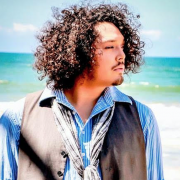“I just want people to know that they don’t have to be afraid of their truth. Your truth is important, your truth is needed.”
Danyol Jaye was sexually abused and raped repeatedly by his older cousin between the ages of 7 and 10. The cousin enabled multiple perpetrator sexual assault when he locked Danyol in a dark closet and had his friends take turns entering the closet to sexually assault him.
Danyol first disclosed the abuse at age 15 to a close neighbor who was a friend of his mother’s. Not ready to share his story with his family, Danyol trusted the neighbor with the information. However, she immediately told his mother, who confronted him.
“It just felt like another violation. I felt in that moment that not only did my cousin violate me and take something from me, but now a person I trusted with this information also violated me and stole another choice from me. That feeling of violation was as hard as it was to endure the actual trauma.”

Danyol underwent a retraumatization from the violation of losing control of his story, and from his family’s reaction to it. Many of his family members questioned why he waited to speak about the abuse, and openly expressed their disbelief in his story. “There was so much conversation about me without me, but no one ever had a conversation with me.”
Because of the abuse, Danyol has suffered from body image issues, depression, and trust issues. Certain triggers related to the abuse—such as dark rooms—also cause him anxiety.